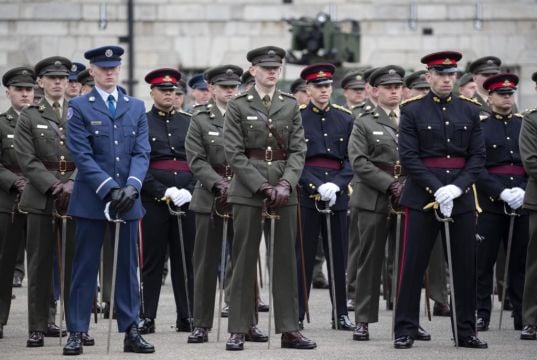If you have been listening to or reading the news lately, the Consultative Forum is probably all that you have heard about. Everything you need to know about the Forum is below.
What is the Consultative Forum?
The purpose of the Consultative Forum is to increase public understanding and generate discussions on our foreign, security, and defence policies.
This Forum will give Ireland a chance to look at the experiences of other European countries when introducing a new security policy.
The Consultative Forum will include participation from civilians, military experts and practitioners, all with different experiences and opinions.
What will be discussed?
The Consultative Forum will discuss a wide range of issues, such as Ireland’s efforts to protect the rules-based international order through peacekeeping and crisis management, arms-control and disarmament, and non-proliferation, international humanitarian law, and conflict prevention and peace building as well as a discussion on Ireland’s policy of military neutrality.
In regard to Ireland's neutrality the Consultative Forum's discussion will be broad and will look at new and emerging threats, including cyber, hybrid, disinformation and threats to critical infrastructure.
The Forum will also look at our current and future engagement in European Union Common Security and Defence Policy, as well as our existing relationship with Nato through the Partnership for Peace.
When and where are they on?
The Consultative Forum will take place over four days in three different locations.
On June 22nd, the forum will take place in University College Cork, the second day of the Forum will take place on June 23rd in University of Galway, the Forum will end in Dublin Castle on June 26th and 27th.
What is the format?
The format will see Louise Richardson as the Forum's chair, an Irish counterterrorism expert who now works in philanthropy. She was the former vice-chancellor of Oxford University.
Experts such as academics and researchers will hold moderated discussions at the forum, as well as military experts and civilians.
Representatives from the embassies of all EU member states, including Austria, Malta and Cyprus, have been invited to attend.
Likewise, representatives from Finland, Sweden, Norway and Switzerland were invited to speak as panellists because, like Ireland, they are active participants in peace building, conflict prevention and resolution, human rights and international humanitarian laws globally, but have different security policies.
Typically, this discussion would have been conducted through a Citizens Assembly, but Minister for Foreign Affairs Micheál Martin explained that the Government had chosen a Consultative Forum because two Citizens Assemblies were already planned on drugs and education.
What have politicians said about the Consultative Forum?
Sinn Féin has described the Consultative Forum as a "blatant attempt to undermine Irish neutrality".
Fine Gael's Minister for Justice, Helen McEntee has welcomed the Consultative Forum saying: "we might be furthest away from what's happening at the moment, that doesn't leave us immune to any threats, so I think we all want to discuss what are our capabilities, how do we defend ourselves."
Social Democrats TD, Gary Gannon said he had genuine fears that there is a drift towards Nato as he said many of the Forum's speakers are "pro-Nato".
Minister of State at the Department of Enterprise, Trade and Employment, Simon Coveney, said criticism of the Forum was "disappointing" and he urged people to get involved with the Consultative Forum.
Likewise, Mr Martin supports the Forum and explained how every European country has to re-examine their security policy following the war in Ukraine. He said: "To shy away from doing so or to do so behind closed doors would have been a fundamental mistake and an abrogation of responsibility."
What did President Michael D Higgins say about the Consultative Forum?
In an interview with the Business Post, the President stated that Ireland is "playing with fire" and "drifting" towards Nato.
He warned about moving away from Ireland's traditional policy of "positive neutrality" and he referred to the Forum's chair, Louise Richardson, as a person "with a very large DBE (Dame of British Empire)".
He has since received criticism that he overstepped the line where the President does not involve himself in politics and has issued an apology for his "throwaway" comments about Louise Richardson.
What will the outcome of the Consultative Forum be?
Once the Consultative Forum has finished, Chief Richardson will draft a report and give it to Mr Martin, who will then decide if he will bring the recommendations to the Government or not.
How can I take part?
Anyone can take part in the Consultative Forum, regardless of if they are an Irish citizen or not.
To attend the Forum you can register or submit an expression of interest. You can also make a submission to the public consultation. If you cannot attend in person, the forum will be live-streamed and recorded on the Gov.ie website.
You do not need to have specialised knowledge to take part as the purpose of the Consultative Forum is to further everyone's understanding of these topics.







